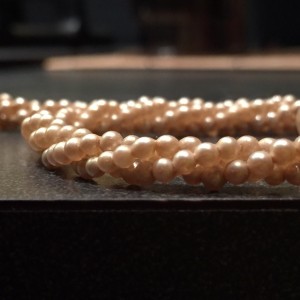 Today would have been my mother-in-law’s 72nd birthday. It’s been almost three months since she died. We called her Ama – the name she took for herself when she became a grandmother. Interestingly, the term ama refers to a Japanese diver – usually female – who tends oyster beds. It’s a great metaphor for what Ama did as a parent and grandparent. She nurtured us, and now we are harvesting her pearls.
Today would have been my mother-in-law’s 72nd birthday. It’s been almost three months since she died. We called her Ama – the name she took for herself when she became a grandmother. Interestingly, the term ama refers to a Japanese diver – usually female – who tends oyster beds. It’s a great metaphor for what Ama did as a parent and grandparent. She nurtured us, and now we are harvesting her pearls.
Ama taught me many life lessons, even in her death. Here are a few to live by:
Be Who You Are – “What you see is what you get,” Ama would chime. She unabashedly shared exactly who she was without getting wrapped up in making a good impression, being judged by others or allowing her choices to be swayed by “shoulds.” Imagine a world where we all showed up in the full expression of ourselves rather than hiding behind drapes of expectation, shields of judgment and walls of fear. The joy and freedom that Ama felt in being exactly who she was – that is possible for each of us.
Live for Now – Perhaps living out this mantra comes more easily after receiving a cancer diagnosis, but even before Ama got sick, she lived with ease and appreciation for the moment. She loved to be spontaneous and helped me to release my iron grip on the handrail of routine and formulation. She taught me to say, “Yes, and…” when my programmed response often started with “But…”. Saying yes and living for the present moment refreshes the spirit and engages us with our world in a revitalized way.
Meet Others Where They Are – I’m pretty good at letting people know where I stand and am happy to help them get up to speed, if necessary. I have only recently realized the flaws to this approach. When Ama would come over, she would sit on the rug and play. She literally met her grandchildren where they were and because of this developed beautiful relationships of mutual respect and trust with each of them. The realization is freeing: I don’t need to change you or convince you of my own validity; I can invest my energy in more constructive and life-giving matters; I can honor the place in you where the universe resides, that is to say, Namaste.
Experience Wonder – In the months leading up to her death, Ama told us that she was curious to find out what came next. “I can’t help but wonder,” she said. Ama taught us to experience wonder in the garden, bringing the kids out to help her pick broccoli or a fresh bouquet of flowers. “Isn’t this amazing,” she would say, picking up a caterpillar, “Look at those tiny legs.” When we slow down and become curious, the world is flooded with possibilities. When we slow down and wonder, we find so much to appreciate.
Practice Gratitude – Ama said her “gratefuls” every night before bed. Long before Oprah encouraged us to keep a gratitude journal, Ama was teaching us to say our gratefuls. In the wake of cancer re-occurrence, she found things to be grateful for. As she lay dying in hospice care, she was grateful to hear about the kids’ first day of school, even though she could barely lift her head from her pillow. Ama’s gratitude was a gift – it gave her a countenance of light that she shined on all of us. I will be forever grateful.
Remember to Laugh – Ama could walk into our house where I was taking my job as Mom very seriously (and getting nowhere) and have us all belly laughing (and all jobs done) in a matter of minutes. What a shift – instead of a drill sergeant mom and rebellious or defeated kids, we had camaraderie, cooperation and connection. Anne Lamott describes laughter as “carbonated holy water.” Laughter reminds us to walk with lightness in our step: we don’t have to be so tightly attached to expectations or ego. In taking ourselves less seriously, in appreciating moments of absurdity or silliness, we open our hearts; we build connection and we can’t help but shine.
Much of Ama’s way of being in the world had to do with showing up authentically and letting go of the need to control things. Just being with things simply as they are (including ourselves) – what freedom that brings.
“The world was made to be free in,” David Whyte urges us in his poetry.
I hear Ama urging me now – “Yes, this. Yes.”
Happy Birthday, Ama.
